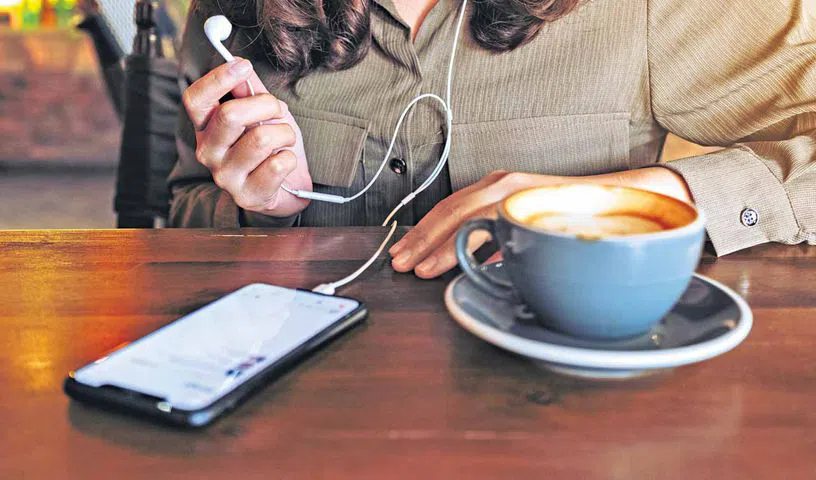MEDIA
Opinion: Craving coffee? Listen to it
www.telanganatoday.com | February 9, 2023
Binaural beats can work as a great external source to help you focus better.
This is a world of never-ending work and deadlines. A world where endless caffeine is consumed just to stay awake and alert. All coffee drinkers are aware of the wonders of one single cup of coffee. Coffee consumption amounted to 12,10,060 kilogram bags across India during the financial year of 2022 (Statista Research Department, 2022). A study by the Harvard school of public health suggests that drinking a moderate amount of 300 mg of coffee might be beneficial (Coffee, 2021).
However, coffee has its fair share of drawbacks. The caffeine in coffee blocks receptors in the brain that induce sleep. This is mostly why coffee helps you concentrate and forces your body to stay awake even though it may be craving some rest. It blocks the adenosine receptors in the brain allowing the body to stay awake. But, an increased daily intake may cause health risks such as insomnia, anxiety and jitteriness.
Getting Addicted
Even though coffee consumption can be moderated, the real problem lies when an individual becomes dependent on caffeine consumption (Meredith et al, 2013). Besides, caffeine also delays an individual’s body clock. If coffee is consumed in the evening, it resets your circadian body clock by pushing your bedtime by an average of 40 minutes (Vogel, 2015). Along with this, it can potentially take away the number of deep sleep hours in the body’s REM cycle as well.
Over the course of time, we have seen widespread research taking place on different types of music and their effects on alertness and concentration along with their influence on different aspects of cognition. Hopkins Medicine talks about how music in general helps reduce blood pressure, anxiety while also improving sleep and mental alertness along with oiling one’s memory. The article also elucidates how music acts as a workout for every brain just like gym goers would say about their bodies (Johns Hopkins Medicine, 2022).
But specific music has specific kinds of effects on the brain. Therefore, if an individual wants to improve their alertness and concentration, what kind of music inhibits this reaction? What if there was a solution to replace the consumption of coffee for staying awake and alert? What if you could listen to coffee instead of drinking it? Here come Binaural beats!
Auditory Illusion
Binaural beats are the new up-and-coming version of “lo-fi” beats to increase alertness and help you stay awake, while you push through your never-ending to-do list. Binaural beats are defined as an auditory illusion that takes place when two adjacent frequencies of oscillatory stimuli are delivered to each ear at the same time, through which the brain recognises the difference between these two frequencies (Lee et al, 2019).
An interesting case study of the use of Binaural beats to create the concept of audio coffee was done by Deli Star with the help of Infrasonics (Serviceplan Group, 2015). It talks about how binaural beats can help drivers stay awake at night, through different frequencies. This advertising campaign by the coffee shop, projected and played binaural beats for truck drivers with long night shifts to remain alert and awake as it was difficult to procure or drink coffee while driving the vehicle.
Natural Synchronisation
The phenomenon often falls in line with “brain wave entrainment technology” where binaural beats often create synonymous brain waves that are experienced during meditation (Cafasso, 2021). To elaborate, brain wave entrainment is a phenomenon wherein the natural synchronisation of brain waves to a frequency or rhythm is presented by music or an external stimulus (APA Dictionary of Psychology, nd). According to Colzato and colleagues, low beta-frequency binaural beats are associated with alertness and improved concentration, whereas delta-frequency binaural beats usually inhibit mental relaxation (2015). This study moves on to suggest that as low beta frequency beats may facilitate attentional control, through the neurofeedback provided by the frontal cortex, it improves attentional efficiency (Colzato et al, 2015).
However, it is important to understand that these beats must be listened to with earphones, preferably at a low volume. The beats are advised to be listened to for around 30 minutes each day. Moreover, while the research on binaural beats is very minimal, there are only a few drawbacks of the same. Depending on the frequency used, binaural beats can affect long-term memory negatively as well. This is supported by a study wherein beta-frequency binaural beats allowed the participants to recall words easily. In contrast, a theta-frequency binaural beat increased distraction and allowed the participants to recollect fewer words (Garcia-Argibay et al, 2019). Further, listening to these beats over 85 decibels may cause hearing loss over long periods of time (Cafasso, 2021).
So, here is a new fix for you in case you have no time to make your signature to-go cup of coffee; ‘Audio Coffee.’ Listen to a tune of binaural beats, be it in your car, while studying or just in order to try and focus on finishing that horrifying deadline. Binaural beats could easily work as a great replacement for coffee in case you are trying to reduce your caffeine intake and still require an external source to help you focus better. Be sure to experiment with the levels of frequency using headphones or a surround system (such as speakers in a car) that helps you focus at your best and allows you to power through any given task!
This article has been co-authored by Prof. Moitrayee Das, Faculty of Psychology, FLAME University and Riva Sheth, undergraduate student (with an interest in consumer psychology), FLAME University.
(Source:- https://telanganatoday.com/opinion-craving-coffee-listen-to-it )

